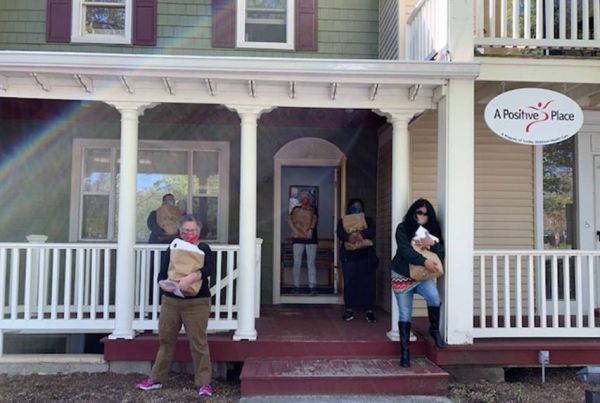July 15, 2020
July 15, 2020
When the COVID-19 pandemic first swept across western Massachusetts and employees at A Positive Place (APP) were asked to work remotely, they immediately thought about the most vulnerable clients they serve and acted quickly.
The APP team reached out to their most at-risk patients – those with a history of heart disease, diabetes, COPD, and liver disease – to make sure that patients’ most basic needs would continue to be met without their having to leave home and expose themselves to another dangerous virus. For many patients, this new pandemic was disturbingly reminiscent of the early days of the AIDS epidemic when a diagnosis of AIDS was a death sentence. What also hit home to many is the fact that Black and Latinx communities carry the heaviest burden of both viruses.
 The team submitted two grant applications for emergency funding and within weeks, APP was awarded $79,000 to provide weekly grocery shopping and deliveries to their clients. In addition to food staples and other necessary supplies, the team packed up care kits, which included masks, hand sanitizer and COVID-19 information and guidelines in English and Spanish.
The team submitted two grant applications for emergency funding and within weeks, APP was awarded $79,000 to provide weekly grocery shopping and deliveries to their clients. In addition to food staples and other necessary supplies, the team packed up care kits, which included masks, hand sanitizer and COVID-19 information and guidelines in English and Spanish.
Funding also helped with short-term rental assistance for those who had lost income due to the public health crisis; individual cab rides to health-related services so as not to be exposed on public transportation; and smart phones to those who are without to allow for ongoing telehealth appointments, online recovery support group participation, and regular check-ins with staff, family and friends to combat the impacts of isolation. Food vouchers were also distributed by APP’s transgender health navigator to HIV negative transgender patients who are vulnerable to the HIV virus.
Reflecting on her team’s work during the pandemic, Director Betsy Shally Jensen, PhD, says that people often ask us why only people living with HIV/AIDS have this kind of integrated clinical care and community health support that patients with other chronic diseases – like diabetes or asthma – don’t. “My response is generally, ‘great question!’” she says.
 Betsy says one of the many lessons revealed during the coronavirus pandemic is just how critical it is to address the social determinants of health, and she reports, “I am now a bit more optimistic that our health care system will find more ways to do so.”
Betsy says one of the many lessons revealed during the coronavirus pandemic is just how critical it is to address the social determinants of health, and she reports, “I am now a bit more optimistic that our health care system will find more ways to do so.”
“In the meantime,” she adds, “APP will continue to integrate the work of community health and healthcare with quality, culturally responsive, and equitable services.”

